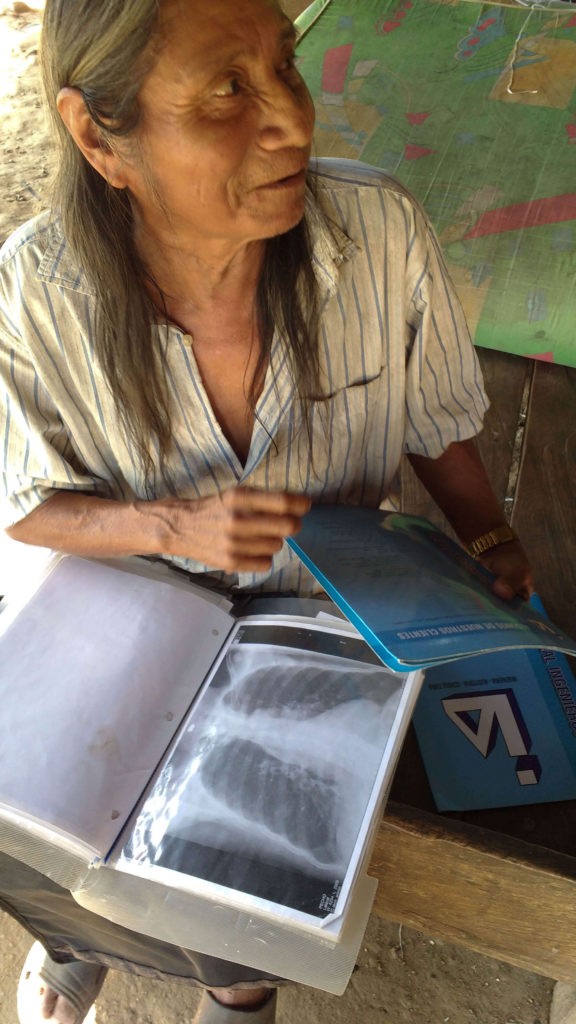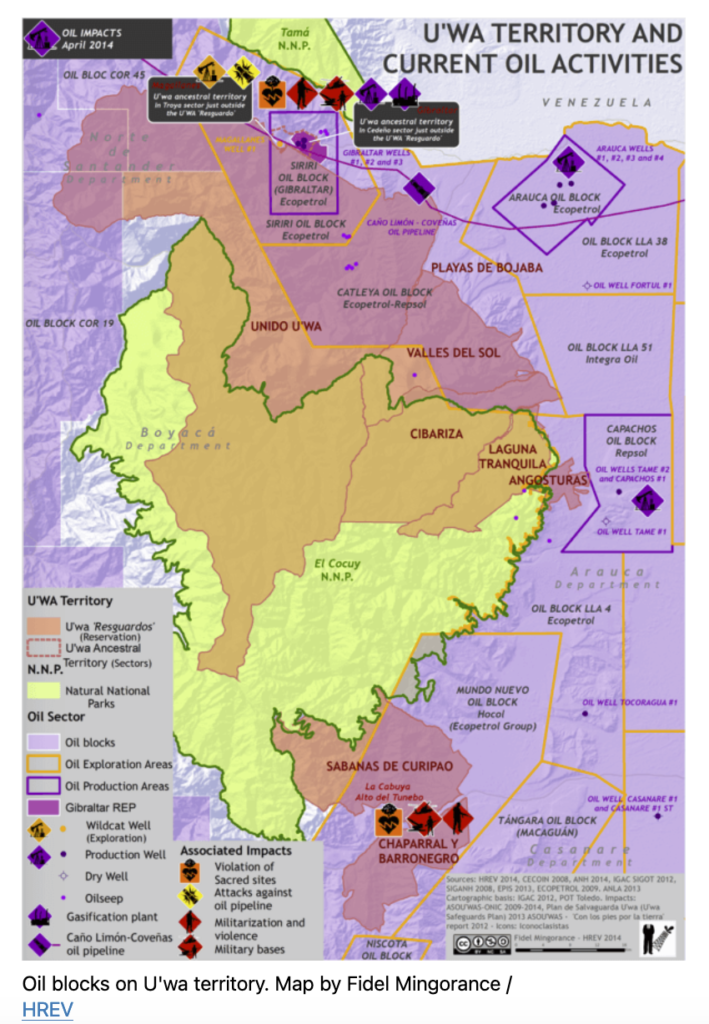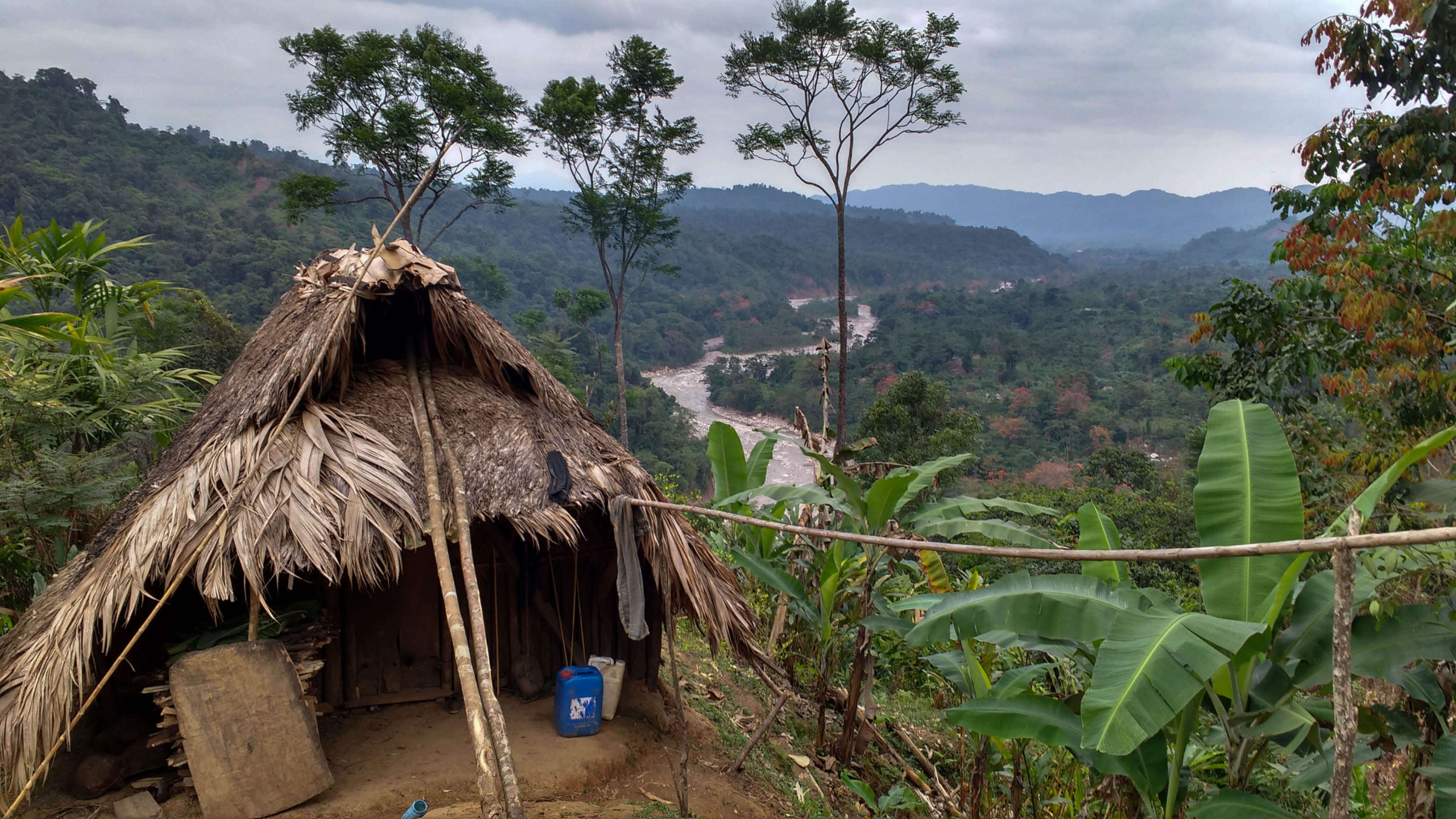Published on IC Magazine: This is the first installment of “The Guardians of Mother Earth,” an exclusive four-part series examining the Indigenous U’wa struggle for peace in Colombia.
On September 23, 2015, in the Palace of Conventions in Havana, Cuba, his excellency Juan Manuel Santos, the President of the Republic of Colombia, and Commander Timoleon Jimenez, Chief of General Staff of the Revolutionary Armed Forces of Colombia, signed an agreement on transitional justice and reparations to the victims of the country’s 51 year old civil war, resolving one of the final points in the country’s peace negotiations.
“We are adversaries, we come from different sides, but today we move in the same direction,” said President Santos, “this noble direction that all societies can have, is one of peace.”
In a show of unity, the warring parties all wore white-collared shirts without ties, as they sat on opposite sides of the brown mahogany tables encircling an artificially bright-green shrubbery arrangement. Around the room’s perimeter stood a throng of reporters, crowded together behind a red rope line, snapping photos of the historic handshake between the president and the leader of the country’s largest guerrilla army. A prolonged war that has killed more than 260,000 people and victimized and displaced seven million more seemed to be drawing to an end.
Among the victims of the conflict are the Indigenous Peoples of Colombia. Of the 102 tribal nations in existence today more than half are at risk of disappearing – forced displacement and mining on indigenous territory during the armed conflict have contributed heavily to the widespread demise.
A progressive genocide of negligence and privation is also taking place. The Indigenous Peoples of Colombia are routinely denied basic commodities such as antibiotics, vaccines and clean drinking water that residents of big cities take for granted, not because the country’s indigenous have been targeted for extermination, but because they have become politically insignificant.
During the Havana peace accord, the indigenous nations who trace their Colombian heritage back thousands of years, from before the time of the Spanish conquest, were not mentioned once.
Inside a wooden shack in the isolated cloud forests of eastern Colombia, three kilometers west of the Arauca river on the Venezuelan border, Berito Cobaria, the internationally recognized leader and spiritual guide of the indigenous U’wa, points out the shades on the x-ray scan of his chest. It shows the same strain of tuberculosis that is ravaging his people.

The single-story hospital in Cubará, the nearest town on the river, is poorly equipped and understaffed. Visits from medical specialists are rare because the hospital is located in the “Red Zone” – conflict areas the Colombian government has declared dangerous due to the heavy concentration of guerrilla forces.
“The government needs to establish a tuberculosis clinic in Cubará,” Berito told IC. He confirmed he is slowly overcoming the deadly disease but despairs for his people as the tuberculosis outbreak rapidly spreads throughout the U’wa Nation’s ancestral lands. The U’wa believe there needs to be harmony in the world for there to be harmony in the cosmos, but the balance of nature has been disturbed and a sickness has fallen upon Berito’s people. Infectious western diseases such as influenza, dysentery, tuberculosis, and the common cold continue to wreak havoc on the unaccustomed immune systems of the U’wa, who up until the late 1940’s lived an isolated existence on the forested cliffs and the remote Andean wetlands and cloud forests of eastern Colombia.
Beginning on February 13th, 2016, Colombia’s second largest guerrilla army, the ELN (Army of National Liberation) imposed a 72-hour armed strike inside Red Zones like Cubará and other towns that border U’wa territory. Under the threat of violence, all stores and businesses in Cubará were closed, the roads were empty and lucky members of the Colombian military got three days’ rest in fortified outposts while their colleagues searched for explosives laid along Highway 66. Despite their dominance in the frontier towns along the Venezuelan border, even the ELN needs to gain permission from indigenous authorities like Berito to enter the ancestral lands of the U’wa. Known as the United U’wa Resguardo, the territory is restricted to all outsiders.
A day after the ELN’s armed strike was lifted, U’wa families on their way to Cubará to stock up on supplies of bread, sugar, eggs and tobacco were traveling barefoot or on the backs of pickup trucks past Berito’s home, which stands sentinel on the eastern border of the resguardo. Ten minutes away at the border town, Colombian soldiers had returned from their outposts to patrol the streets. Stores were serving clients, and locals walked openly with white plastic shopping bags, acts that had been banned and punishable by death during the armed strike. The only trace of the armed strike was the ubiquitous graffiti scrawled on buildings around town: “ELN – 51 YEARS OF RESISTANCE”.
Historically, U’wa territory has been of strategic importance to the Marxist guerrillas because it connects the contraband routes from Venezuela over the Arauca river to the central Andes of Boyacá province, a short drive from the capital Bogotá. Unarmed outside of the agricultural tools they use to cultivate staple crops of yucca, plantains and potatoes, the U’wa authorities will reluctantly grant permission to the ELN to pass through the resguardo on the strict condition they do not set up camp inside their territory. In return the ELN respect U’wa sovereignty, will not enter without permission and will not stop until they have traversed the steep and extremely difficult climb out of the cloud forests and cross the western border of the resguardo, below the snow-capped mountains of the Sierra Cocuy and Güicán.
This region, which is rich in lucrative oil and gas reserves, is also of great strategic importance to the United States’ and Colombian governments, multinationals like Houston-based Occidental Petroleum and Spanish oil giant RepSol, as well as the right-wing paramilitary death squads, which have been historically allied with the central government and big business. For the U’wa Peoples, however, oil is the sacred blood of their Mother Earth, and without its blood their mother will die. For more than two decades U’wa have mobilized aggressive non-violent campaigns to assert more control over their ancestral territory in the midst of one of the most troubled regions of the Colombian Civil War, but it was their struggle against Occidental Petroleum (called Oxy for short) that gained international attention in 1997, when Berito declared that his people “would rather die, protecting everything that we hold sacred, than lose everything that makes us U’wa.”

As Oxy pushed into the U’wa’s ancestral lands, the indigenous nation collectively threatened to commit mass suicide by leaping off a 15,000-foot cliff if drilling on their territory went ahead. This was not a publicity stunt. U’wa tribal lore tells of their people walking off the “Cliffs of Glory” en masse centuries ago rather than submit to the brutal Spanish conquistadors. The U’wa set up a makeshift village beside Occidental Petroleum’s Gibraltar 1 drilling site, and were clubbed, tear-gassed, threatened with rape, evicted, arrested, and harassed by state security forces on behalf of Oxy. A year later in 1998, Berito was given the prestigious Goldman Environmental Prize for leading the non-violent campaign against Occidental Petroleum – the same year the US multinational was complicit in the cluster-bombing of a countryside agricultural community, killing 18 civilians including 9 children, near the resguardo’s south-eastern border, in order to protect the Caño-Limon-Covenas oil pipeline.
The pipeline, jointly run by state-owned Ecopetrol and US-based Occidental Petroleum, pumps up to 220,000 barrels of crude daily from the war-torn Arauca province through U’wa territory on its way to the Caribbean coast. It was also the beneficiary of $100 million US military aid that was granted to the Colombian army in 2003, after Occidental Petroleum spent $4 million lobbying the US government to protect it. The ELN, and their ideological ally, the FARC, have bombed the pipeline more than a thousand times. The consecutive attacks over decades have spilt millions of barrels of cancerous unprocessed crude into the rivers and forests of the region, exponentially more than that of the Exxon Valdez environmental disaster.
In a separate bombing incident in March 2014, the U’wa refused to permit repairs to the pipeline until the government began dismantling the Magallanes drilling site on the northern border of the U’wa resguardo, which Ecopetrol had set up in secret months earlier. The Wall Street Journal reported the Colombian government lost $130 million during the 40-day U’wa protest, which was resolved by dismantling the new drilling rig. Ecopetrol has not cancelled the mining license, however, and the threat of exploitation remains. The most recent attack on the pipeline was a twin bomb attack by the ELN on March 15th, 2016, a week before the deadline to finalize the preliminary peace agreement that President Santos and Commander Timoleon Jimenez had agreed to six months earlier in Havana.
As the March 23rd deadline came and went without even a symbolic gesture of unity, both the FARC and government blamed each other for stalling. A week later the government saved face by announcing to the press it had entered formal peace talks with the ELN, but the country’s second-largest guerrilla army watered down public optimism by stating negotiations would not stop them from attacking critical government infrastructure, which include mining assets in the region and oil concessions surrounding U’wa territory such as Oil Block Cor 19 and Cor 45 which extend across the west and north-west of the resguardo; the Arauca oil block; and RepSol and Integra Oil drilling rigs on the resguardo’s eastern border. There is also Ecopetrol’s Siriri Oil Block, which along with Caño-Limon-Covenas is located in the north of U’wa territory.
A small fraction of a percent of the money rolling in from this multi-billion dollar mining bonanza would be more than enough to fund schools, provide fully-stocked healthcare facilities and install piping to provide clean drinking water for every indigenous and rural community in the region. In one isolated U’wa school inside the resguardo, four computers generously donated by the Colombian government gather dust because there is no electricity; here many of U’wa children are malnourished with swollen bellies because a non-native parasitic worm has contaminated the water supply. In a tin-roofed shack that serves as a hospital in Chuscal on the other side of the resguardo, the head nurse complains of the difficulty of caring for patients suffering from tuberculosis and dysentery because of a lack of vaccines, antibiotics and even clean drinking water after an oil spill contaminated the river.
Now while the international community is openly discussing buzzwords like “Peace Colombia” and “post-conflict” in anticipation of a historic peace agreement between the FARC and government, the U’wa people are demanding high-level talks with the government to address their various grievances. The government response has thus far been to ignore the U’wa, or to invite an indigenous delegation to Bogotá where low-level bureaucrats with no authority merely shuffle papers and nod their heads. Meanwhile, the tuberculosis outbreak continues to spread across U’wa territory.
The U’wa, who call themselves the people who know how to think and speak, consider themselves the Guardians of Mother Nature, and large tracts of land inside their territory have become biological reserves for jaguars, spectacled bears, as well as a kaleidoscopic array of endemic plant and bird life that do not appear anywhere else on the planet. As an ambassador for his tribe, Berito has traveled the world recruiting the support of activists of all stripes, from the late Terry Freitas, native American activists Ingrid Washinawatok and Lahe’enda’e Gay, to the founder of Amazon Watch Atossa Soltani, and Hollywood celebrities like Avatar director James Cameron.
The indigenous leader knows that the ability of his pacifist tribe of 7,000 people to defend themselves against these extremely powerful economic and political forces is limited. This is especially true while numerous multinationals and armed groups battle for control around and sometimes inside his people’s land hidden from the eyes of the international community beneath the forest canopies. Non-violence, however, needs an audience and once again the U’wa leader is calling upon the world to watch over his people.
“History is its own kind of law,” Berito said. “They say the land is dead, but it lives yet. It is only wounded by the taking of oil. The dignity of native peoples comes from the land – and like the land it can be saved.”

Leave a Reply